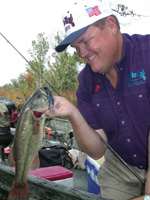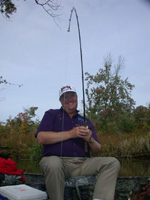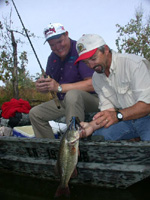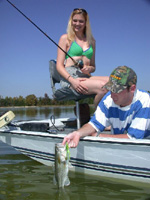
|
Features
|
|
|
|
Books
|
|
|
|
Fun & Games
|
|
|
|
Contact Us
|
|
|
John's Journal... Entry 115, Day 3
"CREATING A BASS-FISHING CAREER"
Davis' Deep-Water Tactics
 EDITOR'S
NOTE: Mark Davis, 38, of Mount Ida, Arkansas, who won the BASS Masters
Classic in 1995 and the Angler-of-the-Year title in 1995, 1998 and 2001,
never has had a career outside the fishing industry. "My dad said
I've never had a real job," says Davis, who is known today as one
of the top bass fishermen in the nation and ranked 3rd in the world for
bass-fishing expertise, according to www.BassFan.com, which rates anglers
according to events won in the past two years with bonus points given
to winning the BASS Masters Classic or comparable events.
EDITOR'S
NOTE: Mark Davis, 38, of Mount Ida, Arkansas, who won the BASS Masters
Classic in 1995 and the Angler-of-the-Year title in 1995, 1998 and 2001,
never has had a career outside the fishing industry. "My dad said
I've never had a real job," says Davis, who is known today as one
of the top bass fishermen in the nation and ranked 3rd in the world for
bass-fishing expertise, according to www.BassFan.com, which rates anglers
according to events won in the past two years with bonus points given
to winning the BASS Masters Classic or comparable events.
Question: You said one of your strengths is deep-water
bass fishing. What do you mean by deep-water fishing, and how do you do
it?
Answer: In most parts of the country, deep-water fishing for bass
involves trying to catch bass in water that is 15 feet or deeper. In some
areas, deep-water fishing may be deeper than 30 feet. I think learning
to fish deep water and then learning to fish shallow water is easier.
If you understand the bass' habits and how the fish relate to structure
in deep water, then taking what you've learned when fishing in deep water
and fishing shallow is easier than learning to fish shallow water and
then having to learn to fish deep water. Shallow-water fishermen often
feel lost when they can't see the bank or the structure they're trying
to fish around.
 Question:
Which fish are the easiest to find -- shallow or deep-water bass?
Question:
Which fish are the easiest to find -- shallow or deep-water bass?
Answer: The deep-water bass are more difficult to locate because
you have to rely more on your electronics and your fish-finding abilities.
When you're fishing shallow, many times you can see where you should be
fishing, for example the cover, the shade, the current, the baitfish and
often the bass you're hoping to catch. But when you're fishing deep, you
can't see any of these features. The real key to finding fish deep is
your ability to cover water efficiently. A depth finder won't locate the
bass for you, although it will help you find the fish, the structure and
the cover. But ultimately you have to find those fish with a rod and reel.
Question: What are your favorite deep-water bass
lures?
Answer: If I'm fishing down to about 18 feet or less, I'll be fishing
a crankbait. If I only can choose one crankbait, I'll use a Strike King
Series V crankbait. By changing my line size and the length of my cast,
I can fish this bait with great success from 5 feet to 12 feet. That depth
encompasses a lot of bass fishing. My favorite color is watermelon shad,
a pearl-colored lure with a light green lime back. Because of its back,
this lure is visible in stained water, and the Series V crankbait makes
this a good clear-water bait since it has white pearl belly.
 Question:
How are you fishing the Series V in deep water?
Question:
How are you fishing the Series V in deep water?
Answer: There are several very important ingredients to fishing
a crankbait successfully. The further you can cast a crankbait and the
lighter line you use and the deeper you hold your rod in the water, the
deeper the crankbait will dive. You have to have the right equipment.
I've found the most-effective way to fish a crankbait is on some kind
of breakline, either an underwater creek channel, an underwater grass
line, an underwater stump row or some other type of break-line. The real
secret to deep-water fishing for bass is to not catch one bass here and
one bass there. Instead attempt to discover a school of bass. You want
to catch your limit of bass out of one spot. If you're fishing in a tournament,
you hope to catch your limit in that spot every day for three days.
Question: What type of retrieve will you use?
Answer: During the summer months, I'm going to use a fast retrieve.
When the surface temperature is 80 degrees or higher, the bass' body metabolism
is high, and the bass want to chase a fast-moving bait. You use a faster
retrieve to get a reaction strike. However, you need to remember that
bass don't read the same magazine articles and books we read. Some days
a slow retrieve is what you need for the bass to bite -- even in hot weather.
But during the winter months, I almost always use a slow retrieve. I may
even want to add a little weight to my crankbait to make it suspend. Then
when I stop the bait, the lure will sit there for a long time so that
the bass can see it and decide to eat it. I may work it really slow through
cover.
Question: Do you have a secret to successful crankbait
fishing?
Answer: Yes, I do. Don't get comfortable when you're
crankbait fishing. Most fishermen will cast their crankbaits out and retrieve
them slow or medium-slow. They'll hold their rods in a way that's comfortable,
and they'll fish so they're really comfortable. But to consistently catch
bass with a crankbait, you need to vary your retrieve, changing the angle
of your rod. When bass want the bait digging in the mud, you'll have to
put the tip of the rod down in the water so that the bait will leave a
mud trail. At other times, bass want the crank bait to barely hit the
bottom, which means you'll have to hold the rod tip up. Try lengthening
and shortening your cast. Be conscious of changing the way you're fishing
a crankbait until you hit on a way the bass wants to take the bait.
 Question:
Why do you want to change up your retrieve so much?
Question:
Why do you want to change up your retrieve so much?
Answer: You have to remember if there's a group of bass sitting
on a point, the fish will see dozens of different lures over a weekend.
If you come by that point and you work that crankbait the same way other
anglers have retrieved theirs, the chances of your catching those bass
are very slim. However, if you're doing something different, something
erratic, something everyone else is not doing, you'll greatly enhance
your chances of catching a bass. The bass on many waterways are conditioned
to lures. Therefore, to be successful, you have to fish different from
other anglers. The way you retrieve the crankbait will determine if you
get the bite.
TOMORROW: DAVIS' TOUGHEST METHOD OF FISHING
Check back each day this week for more about Mark Davis...
Day 1 - How Mark Davis Became
A Professional Angler
Day 2 - Mark Davis' Mental Preparation For
A Tournament
Day 3 - Davis' Deep-Water Tactics
Day 4 - Davis' Toughest Method Of Fishing
Day 5 - How To Become A Tournament Fisherman